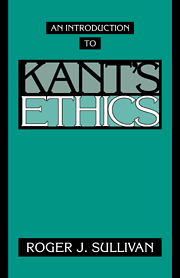Book contents
- Frontmatter
- Contents
- Introduction
- 1 A Beginning: Kant's Political Theory
- 2 The Categorical Imperative: The Ultimate Norm of Morality
- 3 The Formula of Autonomy or of Universal Law
- 4 The Formula of Respect for the Dignity of Persons
- 5 The Formula of Legislation for a Moral Community
- 6 The Limits of the Categorical Imperative
- 7 Morality and Prudence (Foundations 2)
- 8 Moral Character
- 9 Living under the Moral Law
- 10 The Defense of Morality (Foundations 3)
- Suggestions for Further Reading
- Index
10 - The Defense of Morality (Foundations 3)
Published online by Cambridge University Press: 05 November 2009
- Frontmatter
- Contents
- Introduction
- 1 A Beginning: Kant's Political Theory
- 2 The Categorical Imperative: The Ultimate Norm of Morality
- 3 The Formula of Autonomy or of Universal Law
- 4 The Formula of Respect for the Dignity of Persons
- 5 The Formula of Legislation for a Moral Community
- 6 The Limits of the Categorical Imperative
- 7 Morality and Prudence (Foundations 2)
- 8 Moral Character
- 9 Living under the Moral Law
- 10 The Defense of Morality (Foundations 3)
- Suggestions for Further Reading
- Index
Summary
In the first two sections of the Foundations, Kant analyzed what it must mean to say that human beings are moral agents. His analysis yielded this claim: if our common belief is correct, we are moral agents to whom the Law of Autonomy must appear as a categorical imperative (414, 432). What the analysis of concepts by itself could not show is that we really are moral agents (425, 445). But Kant remarked that just formulating the ultimate moral law “more precisely than had been done before” still represented a considerable gain and should not be underestimated (449; see 425).
Clearly, people commonly believe that they can and need to make moral judgments and that they are obligated to do the morally right thing. Kant had enormous respect for the moral judgments of ordinary people (see, e.g., 404). Had such people been his main reading audience, he could have been content simply to offer a clear analysis of the nature of human morality.
Not everyone, however, agreed that his analysis was correct. The two claims most often attacked were (1) his contention that we can know what morality requires of us without being told by some authority or other and (2) his further claim that we are able to do what morality requires without being motivated by desire, whether a desire for what promises satisfaction of one kind or another or an aversion to an unwanted outcome, such as punishment for wrongdoing.
- Type
- Chapter
- Information
- An Introduction to Kant's Ethics , pp. 160 - 174Publisher: Cambridge University PressPrint publication year: 1994



